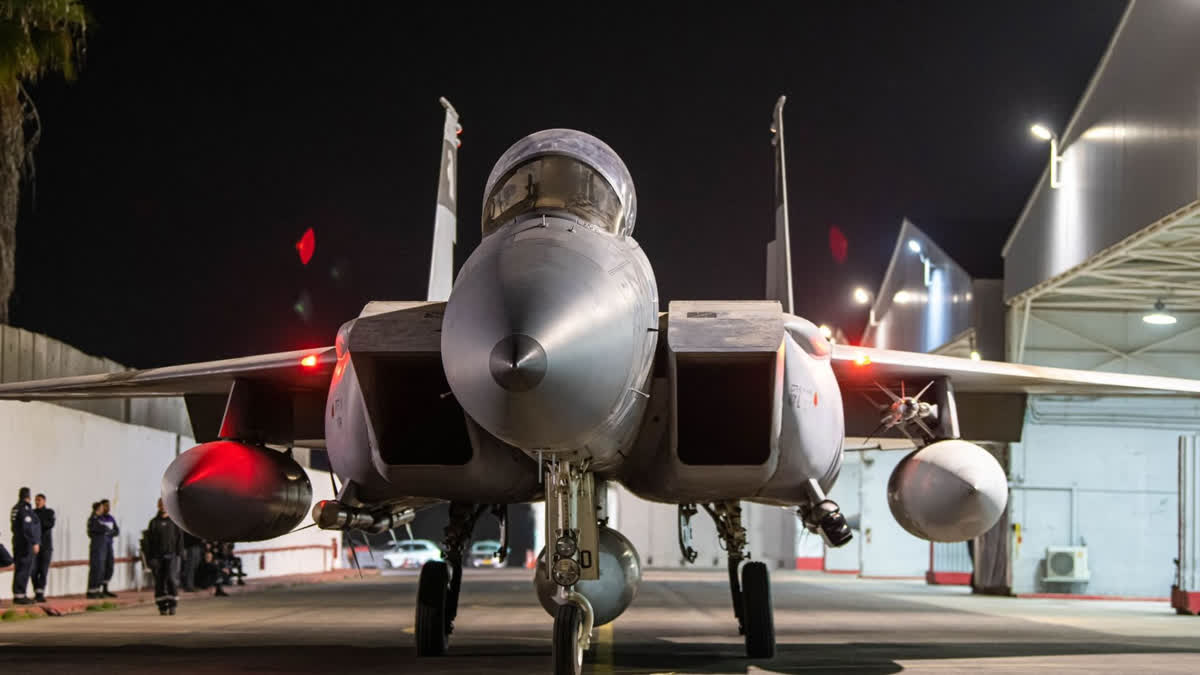Dubai/Tel Aviv: Iran has raised the death toll from the Israeli attack to 4, all from the country's military air defence. Iran has said that the Israeli strikes targeted military bases in Ilam, Khuzestan and Tehran provinces, causing 'limited damage'.
The US said the Israeli strikes on Iran should 'complete' the exchange of fire between enemies and warned Tehran against resorting to any sort of retaliation.
On the other hand, the Israeli military said today that it had completed its air attack on Iran, saying it hit the Islamic Republic's missile manufacturing facilities, surface-to-air missile arrays and other aerial capabilities across several areas of the country.
The latest Israeli strikes marked the first time its military has openly attacked Iran. Following the airstrikes, Iran’s Foreign Ministry said it had a right to self-defense, and “considers itself entitled and obligated to defend against foreign acts of aggression.” Foreign Minister Abbas Araghchi said Iran has “no limits” in defending its interests.
But late Saturday, Iran's military issued a carefully worded statement suggesting any cease-fire in Israel's ground offensives in the Gaza Strip and Lebanon would trump any possible retaliatory strike.
Earlier on Saturday, Israel launched airstrikes on what it described as military targets in Iran in retaliation for a ballistic missile assault Oct. 1, officials said. There was no immediate information on damage in the Islamic Republic.
The attack, threatened for weeks by Israel, comes as the Middle East sits on the precipice of a regional war more than a year after an initial attack by the militant group Hamas on Israel. In the time since, Israel has launched a devastating ground offensive in the Gaza Strip and an invasion of neighbouring Lebanon, targeting militants long armed and aided by Tehran.
Israel's military described the attack Saturday as "precise strikes on military targets in Iran," without immediately elaborating.
"The regime in Iran and its proxies in the region have been relentlessly attacking Israel since Oct. 7 ... including direct attacks from Iranian soil," Israeli military spokesman Rear Adm. Daniel Hagari said in a prerecorded video statement. "Like every other sovereign country in the world, the State of Israel has the right and the duty to respond."
In Tehran, the Iranian capital, the sound of explosions could be heard, with state-run media there initially acknowledging the blasts and saying some of the sounds came from air defense systems around the city.
A Tehran resident told The Associated Press that at least seven explosions could be heard, which rattled the surrounding area. The resident spoke on condition of anonymity for fear of reprisals.
International flights began diverting around western Iran as news of the strikes broke, flight-tracking data showed. But beyond a brief reference, Iranian state television offered no other details and even began showing what it described as live footage of men loading trucks at a vegetable market in Tehran in an attempt to downplay the assault.
Meanwhile, Syrian state news agency SANA, citing an unnamed military official, reported "barrages of missiles from the direction of the occupied Syrian Golan and Lebanese territories targeted some military sites in the southern and central regions" of Syria early Saturday. It said that Syria's air defenses had shot some of the missiles down. There was no immediate information on casualties.
Iran has launched two ballistic missile attacks on Israel in recent months amid the ongoing Israel-Hamas war in the Gaza Strip that began with the Hamas attack on Israel on Oct. 7, 2023. That initial attack killed some 1,200 people and saw 250 others taken hostage back to the seaside enclave.
In the time since, more than 42,000 Palestinians have been killed in Gaza, according to local health officials who don't delineate between civilians and combatants. The U.N. has said hundreds of thousands of people have been trapped with little food or supplies as Israeli forces close in on the northern Gaza town of Jabaliya, while food and other aid remains scarce in the enclave. Israeli military operations in the West Bank in the time since have killed hundreds more.
Israel also has launched a ground invasion of Lebanon and a series of punishing airstrikes that have rattled that country.
The strike Saturday happened just as U.S. Secretary of State Antony Blinken was arriving back in the U.S. after a tour of the Middle East where he and other U.S. officials had warned Israel to tender a response that would not further escalate the conflict in the region and exclude nuclear sites in Iran.
White House National Security Council spokesman Sean Savett said in a statement that "we understand that Israel is conducting targeted strikes against military targets in Iran" and referred reporters to the Israeli government for more details on their operation.
Two U.S. officials said the U.S. was notified by Israel in advance of the strikes. They said there was no U.S. involvement in the operation. The officials spoke on condition of anonymity to discuss an ongoing operation.
Israel had vowed to hit Iran hard following a massive Iranian missile barrage on Oct. 1. Iran said its barrage was in response to deadly Israeli attacks against its proxy in Lebanon, Hezbollah, and it has promised to respond to any retaliatory strikes.
Israel and Iran have been bitter foes since the 1979 Islamic Revolution. Israel considers Iran to be its greatest threat, citing its leaders' calls for Israel's destruction, their support for anti-Israel militant groups and the country's nuclear program.
Israel and Iran have been locked in a yearslong shadow war. A suspected Israeli assassination campaign has killed top Iranian nuclear scientists. Iranian nuclear installations have been hacked or sabotaged, all in mysterious attacks blamed on Israel. Meanwhile, Iran has been blamed for a series of attacks on shipping in the Middle East in recent years, which later grew into the attacks by Yemen's Houthi rebels on shipping through the Red Sea corridor.
But since Hamas' Oct. 7 attack, the battle has increasingly moved into the open. Israel has recently turned its attention to Hezbollah, which has been firing rockets into Israel since the war in Gaza began. Throughout the year, a number of top Iranian military figures have been killed in Israeli strikes in Syria and Lebanon.
Iran fired a wave of missiles and drones at Israel last April after two Iranian generals were killed in an apparent Israeli airstrike in Syria on an Iranian diplomatic post. The missiles and drones caused minimum damage, and Israel — under pressure from Western countries to show restraint — responded with a limited strike.
But after Iran's early October missile strike, Israel promised a tougher response.
Meanwhile Friday, Israeli strikes on residential areas in southern Gaza killed 38 people, including 13 children from the same extended family, Palestinian health officials said.
In northern Gaza, health officials reported that Israeli forces had raided Kamal Adwan Hospital, one of the few medical facilities still functioning in the area. Israel has renewed its offensive against Hamas in the north in recent weeks, and aid groups are sounding the alarm over dire humanitarian conditions.
In Lebanon, Israeli strikes on the country's southeast killed three journalists working for news outlets that are considered to be aligned with Hezbollah.
Israel's Previous Long-Range Missions Of Precision Strikes In West Asia
Israel Took Out Iraqi Nuclear Infrastructure In 1981
In 1981, Israel launched a preemptive attack on the Iraqi Osiraq nuclear reactor. Israel suspected that Iraqi President Saddam Hussein was looking to acquire a nuclear weapons capability. Iraq’s nuclear program made critical progress in 1979 and 1980, with the assistance of nuclear technology imported from France and Italy. In July 1979, US diplomats told their Italian counterparts that it was an “American strong belief” that Iraq was pursuing a nuclear capability.
On 7 June 1981, the Israeli Air Force launched a strike against the Iraqi nuclear reactor Osirak, marking it as the first successful raid conducted against a ‘hostile’ nuclear reactor.
Known as Operation Opera or Operation Babylon, Israel took pre-emptive action by carrying out a successful air raid using its own F15 and F16 jets, destroying Iraq Osirak nuclear reactor. It was located more than 1,100 km (685 miles) from the closest Israeli air base.
Operation Wooden Led – Israel targeting PLO headquarters in Tunis (Tunisia) in 1985
'Operation Wooden Leg' marked Israel’s extensive military operation targeting the Palestine Liberation Organization (PLO) headquarters in Tunis. The Israeli Air Force deployed at least ten two-seat F-15B/D Eagle Baz fighter jets, which travelled approximately 2,200 kilometres from Israel to strike the intended target, achieving a remarkable feat for the nation.
On October 1st,1985 the Israeli Air Force (IAF) executed Operation Wooden Leg, a daring aerial raid on the PLO's headquarters in Tunis in response to terrorist attacks. This mission, Israel's longest aerial strike at the time, used eight McDonnell Douglas F-15 Eagles, typically air superiority fighters, refuelled mid-flight by a Boeing 707 tanker. The IAF successfully destroyed their targets with no aircraft losses, demonstrating Israel's capability and resolve.
Destroying Nuclear Reactor In Syria In 2007
Israel has for the first time confirmed that it destroyed a suspected nuclear reactor being built in Syria in 2007. The military said fighter jets bombed the al-Kibar facility in Deir al-Zour province, 450km (280 miles) north-east of Damascus, as it neared completion.
After the Israeli intelligence community located the building site and predicted that the nuclear reactor would turn operational by the end of 2007, the IDF made plans for an air strike dubbed Operation Outside the Box. At 22:30 on 5 September 2007, F-16 and F-15 jets took off from two bases in southern Israel and flew towards Deir al-Zour, via the Mediterranean Sea and the Syrian-Turkish border. The jets returned four hours later, after conducting a strike that totally disabled the reactor and caused irreversible damage, according to the IDF.
Israel attacked Red Sea port of Al-Hudaydah in Yemen in 2024
20.07.2024: Israel also hit Hodeida port, causing what a port official said was at least $20 million in damage, after a Houthi drone strike penetrated Israel's air defences and killed a civilian in Tel Aviv.
29.09.2024: "In a large-scale air operation Israel struck with dozens of Air Force aircraft, including fighter jets, refuelling planes, and reconnaissance aircraft, attacked military-use targets of the Houthi terrorist regime in the Ras Issa and Hodeida areas of Yemen," Israeli warplanes flew 1200 miles to attack power plants and shipping infrastructure.



